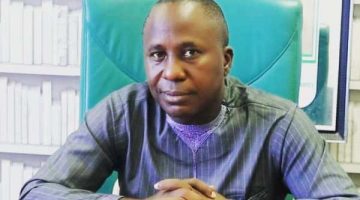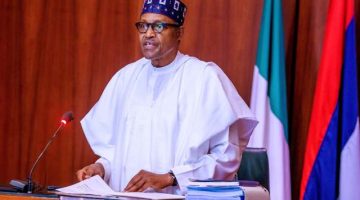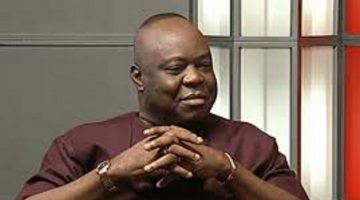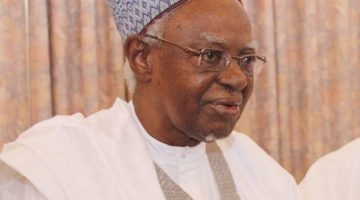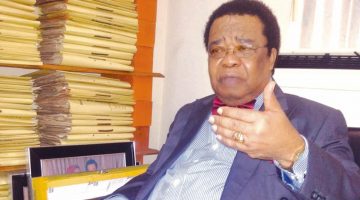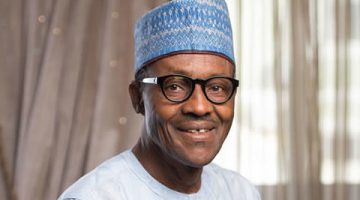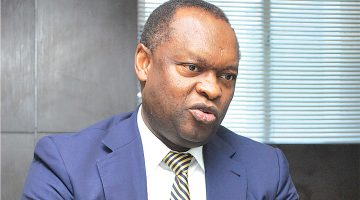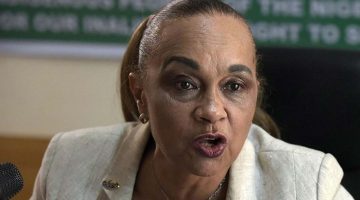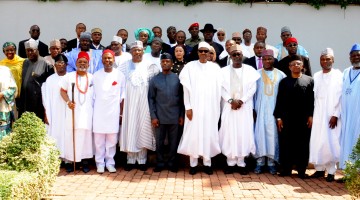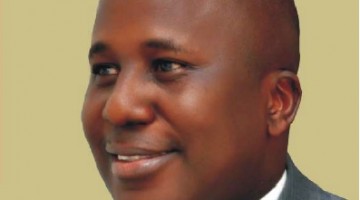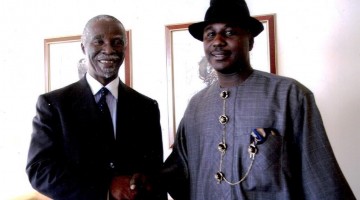BEING THE TEXT OF THE SPEECH DELIVERED BY PROF. STEVE AZAIKI, NATIONAL CO-ORDINATOR OF THE NATIONAL THINK TANK, AT THE INAUGURATION OF THE NATIONAL THINK TANK COMMITTEE ON THE REVIEW OF THE 1999 CONSTITUTION OF THE FEDERAL REPUBLIC OF NIGERIA, ON THURSDAY, MARCH 6, 2008, AT TRANSCORP HILTON HOTEL, ABUJA.
Protocols
I am profoundly delighted to welcome you all to today’s event during which the National Think Tank Committee on the Amendment of the Constitution of the Federal Republic of Nigeria will be inaugurated.
Distinguished Guests, Ladies and Gentlemen,
Since the formal convening of the National Think Tank a year ago, the Central Working Committee has deployed its talents and resources in piloting the affairs of the organization. It inaugurated five standing committees on the 15th of August last year, and has provided quiet but sound counsel to all levels of Government on knotty issues of our time.
In this regard, the National Think Tank has participated in considering the myriad of issues, which now constitute the Niger Delta problem; it also examined the core issues raised during the strike over the increase in the pump prices of petroleum products as well as Value Added Tax (VAT). Furthermore, we have sought to illuminate aspects of the problem of security of lives and property; intervened through the National Assembly in the animated debate following the announcement by the Governor of the Central Bank of a ‘Strategic Agenda for the Naira’ – amongst other issues.
Some have questioned the rationale in keeping a low profile, but today’s swearing in and meeting of the Chairmen of the Committees of the National Think Tank and our Central Executive Committee afford us the opportunity to deliberate on our public profile going forward.
The star event of today, however, is the inauguration of the National Think Tank Committee for the Review of the 1999 Nigerian Constitution. In August last year, the National Think Tank mandated Prof. Macleans Geo-Jaja and a select team to look into the feasibility and modality for the review of the Constitution. The report of that team compelled us to set up the Prof. Chris Ideh Committee which has drawn up specific areas of intervention and scrutiny, as well as structures necessary to achieve the objective of canvassing the people to obtain their views
about the proposed amendments to the Constitution.
Following from the above, at its executive meeting held on the 11th of November, 2007, the National Think Tank appointed a committee to review the constitution. That committee will be inaugurated shortly.
The journey that begins today with the formal convocation of this committee is not a new one. Permit me, then, to take you on a brisk walk through the chequered history of the quest for a durable Nigerian Constitution.
The first body of written law for the area that later became known as Nigeria was the Act of 1862 which provided for the colonial administration of Lagos. This was followed by the Southern Nigeria Act of 1906 and the Amalgamation Act of 1914. The Clifford Constitution of 1922, named after the Governor, Sir Hugh Clifford, was however the first Constitution by the name. The Constitution was made following agitation by nationalists at that time. With the introduction of the Clifford Constitution, for the first time in the history of the country, local subjects were elected into the Legislative Council of 46 members (three from Lagos and one from Calabar).
After the Second World War, the wave of the struggle against colonialism reached our shores. In response, a review of the Clifford Constitution was initiated by Britain. In 1946, the Richards Constitution named after Governor Sir Arthur Richards was adopted. An uproar was sparked in civil society and nationalist circles following their non-consultation during the drafting of the Richards Constitution. This led to a series of activities that culminated in the making of the Macpherson Constitution of 1951 also named after the then Governor Sir John Macpherson. Having learnt from the experience, the British ensured that process was given due attention and before the Macpherson Constitution was promulgated into law, the draft was debated at village, district, provincial and regional levels. In addition, there was a general conference held in Ibadan to discuss the draft. On the 9th of January, 1950, a General Conference of representatives from all parts of Nigeria started a meeting in Ibadan to map out the future system of Government in Nigeria with the recommendations of the Regional Conferences as the working documents.
The Macpherson Constitution ran into a crisis of implementation, leading to the 1953 London Conference and the 1954 Lagos Conference culminating in the promulgation of the Lyttleton Constitution in October, 1954. Under that Constitution, Nigeria became a Federation of three regions: Northern, Western and Eastern regions, removing the elements of unitarism contained in the 1951 Constitution.
In preparation for independence, the London Constitutional conferences of 1957 and 1958 were held, leading to the 1960 Independence Constitution. In 1963, the Republican Constitution was made. The 1979 Constitution was prepared by a Constitution Drafting Committee made up of 49 men, and later reviewed by a Constituent Assembly while the draft of the 1989 Constitution was debated by an elected Constituent Assembly (with one-third of the members appointed by the Military regime), and fundamental alterations to their draft were effected through another review process undertaken by the regime.
A Constitutional Conference was convened to discuss the 1994 Constitution. However, the election into the conference was boycotted in the South-West, as a result of protests against the annulment of the June 12, 1993 election. More than one-third of the membership of the conference was appointed by the Gen. Sani Abacha regime. The 1999 Constitution was promulgated into law by the military regime of General Abdulsalami Abubakar after the Constitution Debate Co-ordinating Committee led by Justice Niki Tobi submitted its report. The Tobi Committee had barely two months to consult with Nigerians before submitting its report.
On 19th October, 1999, President Obasanjo inaugurated the Presidential Technical Committee on the Review of the 1999 Constitution, to co-ordinate and collate the views and recommendations from individuals and groups for a review of the 1999 Constitution. At the time of submission of its report, the word technical had dropped out of the name of the committee, obviously in response to the criticism that constitution-making should not be regarded as a purely technical affair. The Committee, which was initially made up of eighteen members (six from each of the registered Political parties: People’s Democratic Party, All Peoples Party and Alliance for Democracy) was increased to twenty-four to accommodate more women.
Having learnt from these experiences, Constitution Review Committee of the National Think Tank will examine all provisions of the 1999 Constitution, identify those clauses that do not meet the country’s needs at this time, suggest new articles, and make recommendations on the processes required to canvass further country-wide opinion to produce an acceptable Constitution. The aim shall be to produce a document that will provide for the achievement of a stable political and constitutional order that promotes development and aids the conquest of poverty, hunger, disease and ignorance, while also guaranteeing citizens the rule of law as well as acting as the bedrock for a strong, united and democratic Nigeria.
Members of the Constitution Review Committee, who are here gathered today, are renowned experts in constitutional law, Senior Advocates of Nigeria, distinguished legal practitioners and prominent members of other professions. They will review thoroughly, all the materials and proposals emanating from the National Political Reform Conference, the Presidential Technical Committee on the Review of the 1999 Constitution, the National Assembly Joint Committee on Constitutional Reform and the pro-National Conference Organizations (PRONACO). They will also examine international experience in constitution-making in emerging democracies, canvass opinions and memoranda throughout the country and amongst all spectra of civil society, governments at all levels, political parties, organized labour and academia.
The report of the Constitution Review Committee of the National Think Tank, along with the expected huge volume of appendices, will be made available to the National Assembly, as a solid basis for any Government programme to review the 1999 Constitution. That is to say, we envisage that the report of our committee will be an invaluable aide memoire for the apparatus of government to locate its bearing in making the requisite constitutional amendments without seeking to, as it were, reinvent the wheel. This exercise is the National Think Tank’s contribution to Nigeria’s earnest desire to make a document which will unite, uplift and guide us as a Nation, and be true to the declaration in the existing document’s preamble: “We the people of Nigeria… do hereby make, enact and give to ourselves the following Constitution”.
We are cognizant of the truth that the process of adopting a constitution is as important as its substance. The process must be, and be seen to be legitimate. In order for it to be legitimate, it must be inclusive, collating the yearnings and representing the interests of all the various groups in the country. The people must be made to feel, and must feel, that they own the process of producing this document.
This is the basis of the idea of popular sovereignty – the belief that the state is created by the will of its people, who are the source of all political power. This new constitution must take the best from world civilization, and be imbued with the achievements of Athenian democracy, and the Enlightenment idea of autonomy. It must reflect the cardinal notions following from the French Revolution about equality, liberty and brotherhood. It must look to the greatness of the American Declaration of Independence – and the notion that all men are created equal and have with inalienable rights.
Finally, would it be possible to make justice of the opportunity to make a new constitution for a new century, without adopting as basic rights, the UN Charter on Human Rights? Whatever lofty ideals we insert in a Nigerian Constitution, we must always be conscious that such provisions can be effective only if they rest on the people’s tenacious and uncompromising insistence on fairness as a cardinal basis for behavior and insist on the protection of fundamental rights for themselves and their compatriots.
Coming down to practical issues, attention, we the CWC, wish to draw the attention of the new committee to the following matters needing urgent attention. Of course, the committee may wish to direct its probing searchlight at yet other, issues, more deserving attention than this list:
Centripetal and centrifugal political shifts or the balance between Federalism and Unitarism.
Resource control and revenue allocation
Separation of religion and state
Land use and ownership
De-Centralization or otherwise of the Police
Institution of Independent Commissions with broad investigatory powers and prosecutorial authority to promote accountability and transparency in government
Gender equity and the attainment of full social and political
equality of the sexes
Enforceability of fundamental and constitutional rights of citizens
Protection of private property
Political participation, including parties and independent candidacy
Judicial review of State of Emergencies
Election Petitions and the Courts
The Committee’s work should be guided by the principles of inclusivity, diversity, participation, transparency, accountability, autonomy, legitimacy and accessibility. You will seek out all groups of interests – students, women, civil servants, the intelligentsia, the armed forces, the illiterate, the disabled, the poor, the rural dwellers, the youth, the professions, trade unions, religious groups, traditional rulers, community organizations, human rights organizations, pro-democracy groups, political parties, cultural organizations and even prisoners. You will listen to their voices and you shall condense their yearnings.
If the diverse voices are not heard, if their conflicting interests are not resolved, if the unifying bridges and national glue are not reflected in this document, then it will fail to meet the test of legitimacy and will suffer the same dreadful fate that has befallen earlier timid attempts.
We, as a nation, must overcome the natural temptation to despair at the enormity of the challenge before us; we must fight to ensure that the story of our nation, the bedrock of our unity, and the symbol of our democratic choice – the Constitution, must exemplify much more than the struggle among our competing elites to control the political system and hijack the national wealth without recourse to the needs of our teeming populace.
The new constitution must aim to achieve the regulation of the conduct of politics in an accountable and transparent manner, enshrine due process and produce a fair, uniting, equitable, gender sensitive democracy-sustaining document.
Ladies, and gentlemen, permit me to call on Prof Bolaji Akinyemi former External Affairs Minister and Chairman of the Central Working Committee to kindly lead us in swearing in the National Think Tank Committee for the Amendment of the Constitution of the Federal Republic of Nigeria.


